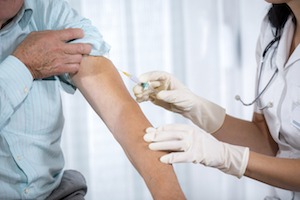Written by Geena Graham
As fall is upon us, and the seasons begin to change, our bodies will start to change as well, acclimating to the new season and temperatures. These changes can be felt even more drastically among the elderly because the older we get, the harder it is for our bodies and immune systems to adapt to change, and the more susceptible we become to catching a cold, getting the flu, or many other illnesses.
Boosting your immune system
The best way to build up your immune system at any age is by sleeping and eating well. As we get older, we tend to eat less and have less variety in our diet, which can contribute to seasonal sickness and other ailments. Eating more fruits and vegetables that are rich in vitamins C and E, beta-carotene, and zinc is important to maintaining good health, as well as maintaining a low-sugar, low-fat diet that incorporates whole grains and lean proteins.
Maintaining a balanced diet, along with getting 8 hours of sleep is the best way to keep your immune system healthy!
Washing your hands
Germs are everywhere, and throughout the day we touch hundreds of surfaces that are dirty and we do not even realize it. Viruses can spread easily from touching a dirty surface and then touching our eyes, noses, and/or mouths. People can also be contagious with a virus before they even know they have it, or before they show symptoms, so you can imagine how easy it is for germs and viruses spread around.
Taking precautions against germs is especially important when it comes to the elderly because aging immune systems are more susceptible to disease. Consistently washing your hands throughout the day is the best way to beat germs, particularly before you eat, or when you are planning to be around other people. Children are the biggest carriers of germs - they are more likely to forget or not know to cover their mouths when they cough or sneeze, and to forget to wash their hands after using the restroom, especially if not accompanied by an adult. This is why adults who are around children are much more susceptible to getting sick, so if you have an elderly loved one that is going to be around children during the holidays, make sure to take extra precautions against germs.
Bottom line: wash your hands as much as you can throughout the day, and be sure elderly loved ones wash their hands often. Keeping your hands clean is the safest way to avoid getting a virus.
Get your Flu Shot
The biggest threat to a seniors during the fall and winter months is the flu, and the best way to prevent this threat and protect yourself and others is by getting a flu shot. A flu shot is recommended for anyone over the age of 6 months, but they are particularly important for people age 60 or older due to weaker immune systems. It is one of the most critical methods in fighting the flu today. The Center for Disease Control or CDC recommends getting a flu shot no later than October each year. The vaccine is adjusted and varies year by year based on which strains of the flu are the most prevalent each year. Flu shots can be administered at most Walgreens and CVS, and also by your Primary Care Physician. Be sure to talk to your doctor about the flu shot and if it is recommended for you.
In short, taking some simple precautions as the seasons change is crucial preventing colds in the elderly. As the weather transforms, so does the body’s ability to fight off the germs that can severely affect the body, especially in the elderly. Keeping the immune system strong, continuing to keep hands clean and getting a flu shot are just a few ways to preserve overall health and well-being.
Contact us for a free in-home consultation to discuss care options.


